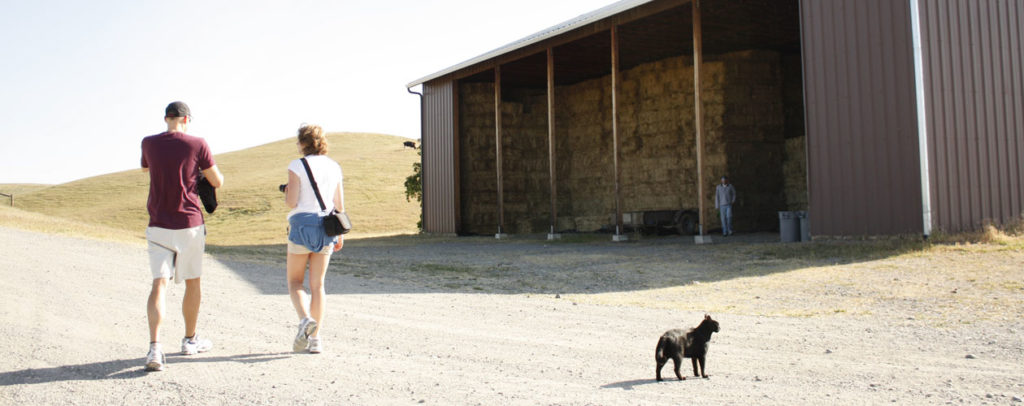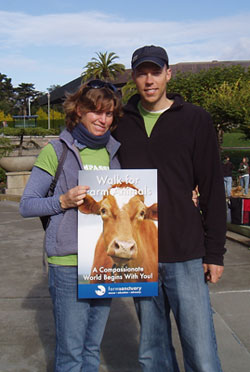
About Us
In May of 2010, we decided to finally align our love of animals, our concern for the environment, and our desire to live long and healthy lives with our food choices. We adopted a plant-based diet.
We had recently watched the movie Food Inc. and read Alicia Silverstone’s book, The Kind Diet. And although this was not the first time we had learned about factory farming or the health risks associated with eating meat and dairy, for some reason, they were part of a tipping point for us. We realized we could simultaneously improve our own health, help slow global climate change, and reduce animal suffering, all by changing what we eat.
Our Health

Before this change, Sharon had been a vegetarian for 17 years, but still consumed dairy and eggs. Pete was an “at-home” vegetarian but still ate meat occasionally at restaurants. Two years later, after eliminating all meat, eggs and dairy from our diet, we feel fantastic.
- Pete’s overall cholesterol level decreased nearly 20%, moving from “borderline high” to the “normal” range.
- Pete’s LDL cholesterol level (the “bad” cholesterol) decreased by over 30%, dropping into the normal range.
- Although already in the normal range, Sharon’s cholesterol level decreased too.
- Sharon’s migraines, which she has had struggled with for 12 years, have been greatly diminished both in frequency and intensity.
- We have lost weight without counting calories or feeling hungry. Pete has lost 10lbs. and Sharon has lost 18 lbs.
- Sharon’s allergies have been greatly reduced and her exercise induced chest congestion has been eliminated.
Some of these effects were immediate, others took several months. In the end, we just feel healthier and stronger than before, and we simply have a lot more energy.
Our Planet
Many people don’t think about global climate change and pollution when they sit down to eat. But according to the United Nations Food and Agriculture Organization, the livestock sector is responsible for 18% of all greenhouse gas emissions, around 40% more than the entire transportation sector (cars, trucks, planes, trains and ships) combined. Additionally, raising all these animals for food uses and pollutes a lot of land and water. The cost of this pollution is paid not by the companies that profit from the factory farms but by the people who live nearby and suffer from the effects of exposure to toxic air and water. It is clear that if everyone consumed less meat, eggs and dairy we could slow global climate change and save resources for future generations.
The Animals

Up until the early part of the 20th century most farm animals were raised on small-scale family farms. These animals generally lived in conditions that resembled how farm life has always been portrayed, with ample space for the animals. The reality today is quite different. The vast majority of animals now spend their short lives in what are euphemistically called concentrated animal feeding operations (CAFOs). In these “factory farms” animals such as cows and pigs are held in overcrowded and unnatural pens while they are fattened up for slaughter. For the animals in these CAFOs, sickness, fear and suffering are everywhere.
For years, we thought that dairy and eggs were different. We assumed that because the animals weren’t killed in order to produce milk and eggs, it wasn’t so bad. In truth, the animals are still eventually slaughtered, but before that they have their babies taken away from them (dairy cows are kept pregnant continuously and never get to bond with their babies) and live their entire lives in discomfort to produce food for us. When we really sat down to think about this, we knew that for us, eating cheese and eggs wasn’t worth the suffering imposed on these animals.
Billions of farmed animals spend their short lives living in inhumane conditions and die each year to provide the meat, milk and eggs that so many Americans eat. We believe that this is an unacceptable amount of fear, pain and misery. We are heartened to know that by adopting a plant-based diet, each of us can prevent this fate for thousands of animals over the course of our lifetimes.
Cooking Vegan
Many people assume that cooking and preparing food as a vegan is very difficult and time-consuming. Some believe that vegan food must be boring and tasteless. We couldn’t disagree more. Initially we did spent a lot of time reading about plant-based nutrition, stocking our pantry and looking for recipes. But, after a short time, we got much more efficient in our new vegan kitchen. Plus we are eating better than ever and we’re having fun! Our food is the most delicious food we’ve ever eaten and we often struggle with the decision to eat out at restaurants because we love our own cooking so much. We’re not doing anything exceptional to prepare this food. Mostly it’s just chopping, mixing, boiling, steaming, simmering, and roasting. You don’t need to be a trained chef to cook this way…you just have to be willing to gather the right ingredients and follow directions!
Making a Difference
“How wonderful it is that nobody need wait a single moment before starting to improve the world.”
– Anne Frank
There is a lot of pain and suffering in our world, for people and animals. It isn’t often that you realize that you have the power to stop some of this suffering. We think of this power as a responsibility too. We have created this website in hopes that other people will make the transition towards a more sustainable and humane diet of plant-based foods. We hope you will use it as a resource, make delicious food and feel as good as we do as a result. Please contact us if you have any questions about anything on our site or if you’d like to ask us any questions about our new way of life.
Sincerely and compassionately,
Pete & Sharon
